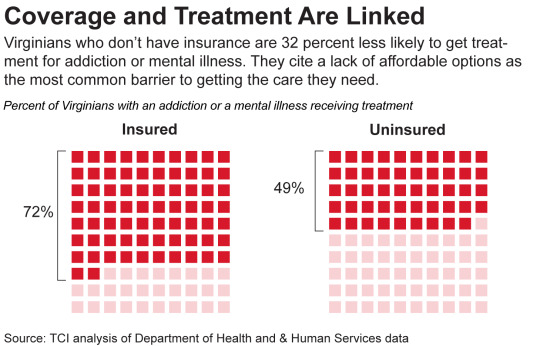April 6, 2016
Closing the Coverage Gap Could Combat Addiction and Mental Illness
One of the most effective ways to help the 102,000 uninsured, low-income Virginians who also have a drug or alcohol problem or a mental illness is to accept the federal funding to close the state’s coverage gap, according to the latest U.S. Department of Health and Human Services (HHS) report.
Helping people get coverage enables them to get the services they need. In Virginia, people without insurance who have a mental illness or substance use disorder are 32 percent less likely to receive treatment than people with insurance who face the same challenges, according to the report. Although Virginia lawmakers have given some attention to these issues, the state’s restrictive Medicaid eligibility rules leave many without viable options for getting the help they need. One lawmaker who has given this issue his full attention, State Sen. Creigh Deeds, recently noted that closing the coverage gap “would be the single best way to improve mental health care in Virginia.”

Closing the coverage gap is also the most cost-effective way to tackle Virginia’s addiction crisis and help people living with mental illness. Accepting the federal funds would provide comprehensive treatment to those most in need at a minimal cost to the state. In fact, closing the coverage gap could have saved the state $157 million over the next two years by using federal funds for comprehensive coverage rather than state dollars for a patchwork of safety-net programs.
Preventing drug and alcohol problems before they begin is also an important long-term strategy for combating addiction. Closing the coverage gap would increase prevention opportunities for many of the most vulnerable Virginians, especially youth. That’s because routine primary care is an important avenue for detecting and treating early substance misuse or mental illness before more significant problems develop. And states that closed the coverage gap for low-income adults and parents in 2014 saw a larger decline in the number and percent of uninsured children than those that did not, enabling more families to afford primary care.
Investing in preventing and treating substance use disorders and mental illness is pragmatic and cost-effective. Virginia lawmakers know this is true because they are using state dollars to increase access to these services for some people. Now it is time for them to close the coverage gap to make sure that all Virginians can obtain the quality, affordable care they need to be healthy and productive.
Category:
Health Care
